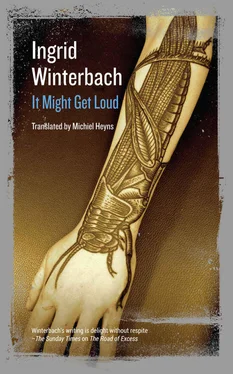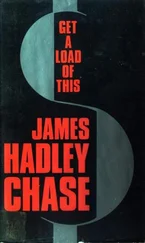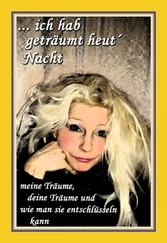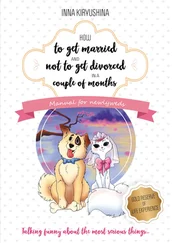In the botanical garden the presence of plants exerts a beneficent and soothing effect on her state of mind. In the newspaper she reads only the death notices. One in particular makes a deep impression on her. A woman mourns her deceased sister. You were my mother, my friend, my dearest sister. Until we meet again. Maria cuts out the item and pastes it in her diary.
She is living in an anonymous space here, and that is how she prefers it. Nothing to remind her of anything, except of her conjunction with the man, the lover. She has no need here of a familiar space. She doesn’t want to be reminded of anything. She’s brought nothing personal with her — apart from Sofie’s little red book and the big natural history book.
When her lover with the Daisy Duck upper lip is out of town (often) and she can’t sleep at night (more and more frequently), she looks at the red book and the nature book. Difficult to recognise Sofie in the disciple clamouring to God for forgiveness.
Her and Sofie’s last meeting was in the park. Maria was visiting and Sofie had suggested it as a rendezvous. Sofie lay on the grass on her stomach, supported on her elbows, her hands clasped together. Delicate wrists. She looked down as she talked. Her eyes only now and again met Maria’s — large eyes, guarded gaze. Large features, attractive, robust, expressive face. Her abundant hair cut short. A little distance away two big tortoises were mating with a noisy clashing of carapaces. This was before the publication of Sofie’s last volume. After its publication Maria congratulated her by email — that was nine months or so before Sofie’s death. Maria couldn’t really get into the volume. As hard as stone, she thought, as cold as ice. What the hell is the matter with Sofie, she thought, what’s happened to the Sofie of old — her playful, boisterously obstreperous sister?
Maria reads in the natural history book about the Moray eel. It has a large mouth and sharp, strong little teeth. It lies in wait in a rock crevice underwater peeking up, only its head outside its hiding place. There is one of them in the aquarium in Durban. She must go and have another look at it. A close look. Who knows what she could learn. This eel does not look edible to Maria — Sofie must have had the European eel in mind in her recipe — it would give her the heebie-jeebies to slaughter such a beautifully patterned creature. (It would give her the heebie-jeebies to slaughter anything .) Maria once read somewhere that sailors long ago wore their hair in two styles — either in little rats’ tails, or in a single plait. A pickled eel skin was then taken from a brine barrel, carefully peeled back (like a condom) and slid up to cover this plait. For decorative effect it was tied with a red ribbon. An eel skin peeled like a condom — what would Sofie have made of it?! She would have bust a gut laughing, and come up with something even more outrageous. A month or two before Sofie’s death Maria wanted to send her the Timbuktu limerick, the one in which one Tim and a friend go hunting and meet up with three whores in a pop-up tent. Just up Sofie’s street. Also in the light of the dream that Sofie had way back about the three old whores in the ghost town of Durban. She didn’t send it. She no longer had the inclination or the nerve. No, damn you, Sofie, she thought, it’s time you got in touch with me for a change.
Now Maria wonders what sorrow and tribulation compelled Sofie, garbed in a coat of locust skin or in sackcloth or hair shirt, to toil arduously with a pilgrim’s stick and staff, through the inhospitable terrain of humility and renunciation?
*
It’s raining. It’s cold. Winter has arrived. So here she is now, Maria thinks, and it suits her very well. At night the wind blows in gusts, or it rains, she’s not sure which. Nobody can reach her here, that’s what it feels like. (Of course Joy Park could, and Benjy, and the lover, and her ex-husband, should he want to enquire after the welfare of their child.) It’s raining, it’s bitterly cold, she digs in. She sits by the heater. She pages through Sofie’s book (still looking for something in it), she bends over the visual guide to all living creatures on earth: locust, cricket and eel, bat (with its vampiric countenance, its pricked-up little jackal’s ears, its great hemeralopic eyes), polecat and civet-cat, otter with its webbed paws, killer whale, beetle, skylark and water mongoose. There’s nothing systematic about her desultory survey, and at times she’s distracted by recurring thoughts (where Sofie’s ashes could possibly be stored or strewn; the allure of the man’s infranasal groove). At times she can almost imagine that Sofie is standing behind her: an absent-minded presence. An evanescent, restless shade from the land of the dead, the region of the river Acheron.
In the little red softcover book Maria finds only the yearning and clamation of the disciple, in a state of readiness and sharpened, purified receptiveness. Nowhere else in it does Sofie permit herself to be seen. If her sister is to be recovered in any other place, Maria decides, it is in the grave gaze of Justinian and Theodora, in the high hat of Persephone, in the Phrygian cap of Orpheus, in the sombre whisperings of the eel.
*
Maria and the man gaze into each other’s eyes. First she lets her tongue hover and linger at the entrance to his mouth, teasingly she caresses the corners of his mouth, only then does she thrust it deep into his mouth. He sucks her out like a marrowbone. Then he rams himself deeply and forcefully into her, without false modesty or reticence. They batten on each other’s bodies like snails on a carcass. (This she often witnessed in the subtropical regions.) She thinks: Good Lord, can it be, am I becoming besotted with this man?
While it rains outside, the mountains by day are swathed in trails of drifting mist; the wind by night drives on the rain in violent flurries. While her partner is lying on the other side of the world in the arms of a newfound lover — Eastern, Western? She hasn’t even asked. While her tenant, Joy Parks, is lying dismayed and defeated in a state hospital in the last colonial outpost, the only white among a host of suffering blacks. And Benjy, her child whom she raised on goat’s milk, lowers his head, forges ahead tenaciously in the face of adversity, intimidation and lost love. She groans and sighs. It’s not infatuation, it’s something that approximates more closely to notions of extinction and finitude.
She calls out his name! The rain pours down in sheets! The trees bend in the wind! Everything is possible! Inform me about extinctions, about the last days, about the folly of my people! she cries out in the urgency of love. Inform me about the five million metric tons of ash! The melting poles! The rising sea levels! The disrupted food chain! The massed armies of the hungry! The monstrous rich — inviolable citadels of greed! The terrible social inequalities in the country! The fallacies regarding race! Everything is possible! The graves of my parents! My dead mother! My dead father! The cryptic little book — bequeathed to me by my deceased, demented, bloody-minded sister.
Heavens, she thinks, but how the man charms her.
*
At night Maria is on the look-out for the moon. For three nights running the heavens are so impenetrable, there might as well never have been a moon. In the early mornings, by the first glimmerings of light, she walks through the cold, wet streets. She must see the mountains at first light. When it’s raining, they’re not visible. When the heavens relent somewhat, they are there: sometimes with trailing drifts of mist on the highest peaks. The nearest mountain first catches the light — when the weather’s clear, the first, warm light enfolds the mountain from behind, the detail becomes visible, while the other mountains, further away, are still solidly silhouetted against the lightening morning sky.
Читать дальше












